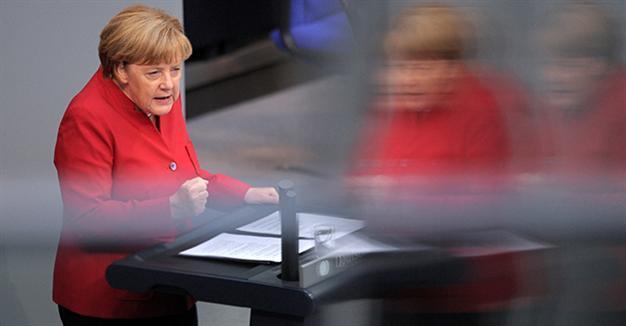Migrant deal in interest of both Turkey, EU: Merkel
BERLIN

REUTERS photo
German Chancellor Angela Merkel has refused to step back from her migrant policy despite frustrations at her Christian Democratic Union (CDU) party’s humiliating loss in a regional vote, instead praising the European Union’s recent deal with Turkey.“The EU-Turkey agreement is in the interest of both sides,” Merkel said, adding that the EU and Turkey as well as Syrian refugees had benefited from this.
“It is right for us to fight the illegal trade of people smuggling... since we’ve had this deal, almost no one has drowned in the Aegean Sea,” Merkel said.
The EU-Turkey deal should also serve as a model for future agreements with Libya and Tunisia, said the German leader.
Under the deal, Ankara agreed to take back unregistered migrants who land in Greece in exchange for billions in aid as well as visa-free travel to the bloc.
However, today the deal hangs by a thread as the EU puts pressure on Turkey to change its anti-terror law, a part of the 72-item requirements for free travel for Turks.
Ankara says such a shift is not possible due to terror risks that the country has been facing, mainly posed by the outlawed Kurdistan Workers’ Party (PKK), the Islamic State of Iraq and the Levant (ISIL) and the followers of the U.S.-based preacher Fethullah Gülen, believed to be have staged the bloody July 15 coup attempt.
Turkish EU Minister Ömer Çelik used a news conference on Sept. 6 with Portuguese Foreign Minister Augusto Santos Silva to call for visa-free travel within the EU for Turkish nationals, as promised under the deal, to be accelerated.
“The visa-free deal is the key issue for us,” he said. “We want this visa-free deal to be realized at once.”
A delay in the visa liberalization deal until the end of the year is out of the question, President Recep Tayyip Erdoğan’s spokesperson, İbrahim Kalın, said Sept. 6.
Merkel hit back at critics of her open-door migrant policy on Sept. 7, urging all parties to fight the anti-immigrant Alternative for Germany (AfD) with facts.
In a combative speech to the Bundestag lower house of parliament, Merkel directly addressed the outcome of the Sept. 4 election in the eastern state of Mecklenburg-Vorpommern where the AfD pushed her Christian Democrats into third place.
“All of us should realize the AfD is a challenge not only for the Christian Democrats ... but that they are a challenge for everyone in this house,” she said, suggesting that the AfD’s anti-immigration policies were a threat to the values of society.
In the weekend vote, the AfD, which has fed on fears about the influx of around a million migrants to Germany last year, stole voters from all parties and mobilized many people who had previously not voted. It is now represented in nine of Germany’s 16 states and looks poised to enter the Bundestag next year.
Merkel, who is expected to stand for a fourth term in next year’s federal election, said much had already been achieved since the height of the migrant crisis a year ago.
“We have behind us a year full of decisions… to reduce the number of migrants,” she said. She added her government had taken steps to help local authorities pay for refugees, passed an integration law and accelerated repatriations of migrants denied asylum and boosted security.
Separately, Turkey must apply the EU deal, neighboring Bulgaria’s foreign minister said on Sept. 6.
One million people fleeing conflicts in the Middle East arrived in Europe last year, many coming via Turkey, and several EU states, including Bulgaria, fear a fresh influx if the deal breaks down.
“The EU-Turkey agreement on migration needs to stand and be implemented,” Daniel Mitov, whose country borders Turkey, told Reuters in an interview.
“What we want to emphasize is that the readmission agreement needs to be implemented before visa liberalization,” Mitov said.
“We need to continue the dialogue and find the way to downsize and decrease the temperature of the rhetoric that has emerged. We need to talk to each other and not at each other,” he said.
















